Madagascar
The overall objective of the project is to improve labour relations and working conditions in accordance with sustainable development objectives. The project is also promoting the ILO Tripartite Declaration of Principles concerning Multinational Enterprises and Social Policy (MNE Declaration), referenced in the EU Trade for All Policy and the Trade and Sustainable Development chapters of EU Trade agreements.
Madagascar has been a member of the ILO since 1960 and has ratified all eight fundamental ILO Conventions. It has also ratified the 2014 Protocol to the Forced Labour Convention, 1930 (No. 29), the four Governance/Priority Conventions as well as 35 Technical Conventions of the ILO. Notably, in 2019, Madagascar ratified a total of six conventions on the occasion of the ILO centenary, including the aforementioned Protocol on Convention No. 29 on Forced Labour and three conventions instrumental to combat human trafficking – namely the Private Employment Agencies Convention, 1997 (No. 181), the Domestic Workers Convention, 2011 (No. 189), and the Migrant Workers (Supplementary Provisions) Convention (No. 143), 1975. In addition, Madagascar has ratified the Public Service Labour Relations Convention, 1978 (No. 151), in accordance with the recommendations issued by the Southern African Development Community (SADC) of which it is a member, and the Convention on Collective Bargaining, 1981, (No. 154). In 2023, the country also ratified three conventions related to Occupational Safety and Health, namely the Occupational Safety and Health Convention, 1981 (No. 155); Occupational Health Services Convention, 1985 (No. 161); and the Promotional Framework for Safety and Health at Work Convention (No. 187), 2006 which will enter into force for Madagascar on June 15, 2024. Of these, Conventions Nos. 155 and 187 are ILO Fundamental Conventions.
The ratification of numerous ILO Conventions by Madagascar undeniably testifies to the country’s commitment to International Labour Standards (ILS) and to the ILO supervisory mechanism to support the implementation of the obligations therein. The project aims to provide support to constituents in the implementation of ratified conventions.

Objective
The overall objective of the project is to support the Malagasy Government, institutions, and social partners to strengthen the implementation of the International Labour Standards ratified by Madagascar.
The project is also supporting tripartite constituents to allow them to make better use of the ILO MNE Declaration to strengthen the nexus between decent work and trade.
Achievements
The country has developed a new labour code, in line with its latest ratifications of international labour conventions. The project contributed enormously not only to the processes of developing this new labour code, but also to its popularization at all levels.
As a result of the project, social dialogue and labour governance in Madagascar have been strengthened significantly.
The project played an important role in supporting the National Labour Council and contributing to the finalisation of the revision of the national Labour Code. In addition, the project significantly contributed to the ratification of several ILO Conventions including Conventions Nos. 155, 161 and 187 with the process for the ratification for Convention No. 190 being underway; demonstrating the commitment of the country to adhering to international labour standards. In addition, awareness raising activities on the Fundamental Conventions (Conventions Nos. 29, 138, and 182) and Convention No. 190 were organized.
The project provided substantial support to Madagascar in fulfilling its commitments to report on international labour standards and to respond to the recommendations of the ILO supervisory bodies. This is evidenced by the production by the Government of 14 out of the 34 reports outstanding to the ILO supervisory bodies in 2021. Notably, the country successfully fulfilled its reporting obligations on international labour standards in 2022 and 2023, submitting 26 and 6 reports respectively to the ILO supervisory bodies, with no outstanding reports remaining.
The project undertook capacity building initiatives on international labour standards benefitting constituents such as institutions, social partners, civil society, etc. The support contributed to strengthen the implementation of ratified ILO Conventions, especially the Fundamental Conventions.
Following sensitization and capacity building activities organized by the project, Madagascar designated national focal points for the promotion of the Declaration of Tripartite Principles on Multinational Enterprises and Social Policy (MNE Declaration) in accordance with annex II of the instrument. The project supported the development of a joint action plan for the national focal points and is providing support for its implementation. A tripartite dialogue for the promotion of sustainable, responsible, and inclusive business practices in the agricultural sector allow to build agreement on specific follow-up actions to promote the MNE Declaration and responsible business conduct in the agriculture sector. The agreed actions were integrated in the national action plan of the focal points.
Furthermore, the establishment of a national dialogue mechanism for the promotion of the Just Transition towards an ecologically responsible economy is currently underway.
The project has actively facilitated the monitoring and implementation of various activities, enhancing the overall impact of its efforts in promoting decent work and labour rights in the country.
Activities
In Madagascar, the project focuses on the following objectives:
- Supporting the country in implementing ratified ILO Conventions, particularly those covered by the 1998 ILO Declaration on Fundamental Principles and Rights at Work.
- Strengthening the capacities of institutions, labour inspectors and social partners on international labour standards and Fundamental Principles and Rights at Work in order to promote a better understanding of ILO Conventions and enhance their ability to apply the Conventions to resolve disputes at work.
- Supporting constituents in activities to combat child labour.
- Supporting constituents in promoting sustainable, responsible, and inclusive business practices in alignment with the Declaration of Tripartite Principles on Multinational Enterprises and Social Policy.
- Strengthening the national dialogue mechanism to facilitate and advance the just transition towards an ecologically responsible economy.
Resources
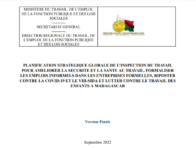
Guidance / Madagascar
Planification stratégique globale de l’Inspection du travail
September 30, 2022
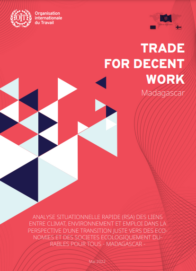
Guidance / Madagascar
ANALYSE SITUATIONNELLE RAPIDE (RSA) DES LIENS
May 30, 2022
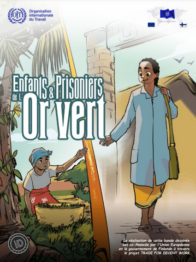
Informative / Madagascar
OIT – BD – ENFANTS PRISONIERS DE L’OR VERT
December 30, 2023
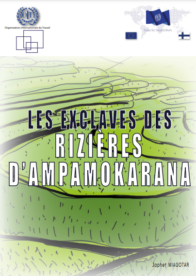
Informative / Madagascar
Travaux forcés-Les exclaves des Rizières d’Ampamokarana
December 1, 2023
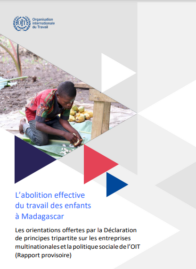
Informative / Madagascar
Abolition effective du travail des enfants Madagascar
May 30, 2023
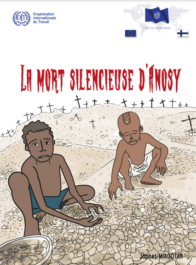
Informative / Madagascar
Mort silencieuse dans les mines d’ANOSY
December 30, 2022
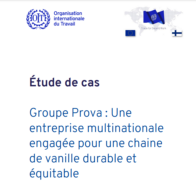
Informative / Madagascar
Groupe Prova-Une entreprise multinationale engagée pour une chaine de vanille durable et equitable
December 1, 2022
Fundamental Conventions and selected international labour standards and protocols ratified
Ratification of ILO Conventions and national labour reform
Support for the ratification of ILO Conventions Nos. 155, 161, 187, 190 and MLC, 2006 and the revision of the Labour Code
The project supported the National Labour Council to successfully ratify four ILO conventions in June 2023, namely the Occupational Safety and Health Convention, 1981 (No.155), the Occupational Health Services Convention, 1985 (No. 161), the Maritime Labour Convention, 2006 (MLC 2006) as amended and the Promotional Framework for Occupational Safety and Health Convention, 2006 (No. 187). These ratified conventions are expected to come into force in the country in June 2024. In addition, the project supports the preparation for the ratification of the Violence and Harassment Convention, 2019 (No.190) and the finalization of the revision of the national Labour Code (to be tabled before the National Assembly in 2024).
Action
- Support to the National Labour Council
- Organization of various trainings and awareness-raising workshops on Convention No. 190 in 3 regions (2022, 2023)
Results
- Finalization of the Labour Code revision
- Ratification of four conventions: Conventions Nos. 155, 161, 187 and MLC, 2006
- Finalization of the process of ratification of Convention No. 190
- Strengthened social dialogue
- Capacity of more than 200 people (including 60% women) enhanced to prevent, report and handle cases of violence and harassment in workplaces and technical establishments
Implementation of ratified ILO Conventions
Strengthening the capacity to report on ratified Conventions
In order to enhance implementation and reporting on ratified conventions, the project organized a national symposium in March 2022. The primary objective was to rally national stakeholders to recognize the necessity of establishing an action plan aimed at streamlining the writing and submission process for the country's annual reports on international labour standards.
Action
- Organized a national symposium (2022)
- Support to the reporting work on ratified Conventions
Results
- Established an action plan to meet reporting obligations on ratified conventions
- Strengthened the implementation of ratified conventions
- All reporting obligations met in 2022 and 2023 with no outstanding reports
Support for the implementation of Conventions Nos. 138 and 182, particularly in the vanilla and mica sectors, Convention No. 29, and its Protocol
The presence of child labourers under the legal age and young workers exposed to occupational safety and health risks is a significant concern. The project focused on building the capacity of the labour inspectorate to tackle child labour in the vanilla and mica sectors in two regions- Anosy and SAVA. This initiative was undertaken to support the agenda of the Government to mobilize the labour inspectorate to take action against child labour as part of its strategic planning.
Action
- Training of 38 Labour Inspectors on child labour (2022)
- Development of 3 comic strips on child labour in the mica and vanilla sectors and on forced labour in the agricultural sector- to be finalized in 2024
- Supported the revitalization of regional committees to combat child labour (CRLTEs)
Results
- Strengthened the capacity of the labour inspectorate to promote compliance and combat child labour in the mica sector
- Enhanced awareness among all persons of the Minimum Age Convention, 1973 (No. 138), the Worst Forms of Child Labour Convention, 1999 (No. 182), the Forced Labour Convention, 1930 (No. 29) and its 2014 Protocol
- Strengthened the capacity of the Government to combat child labour
Capacity building for magistrates on international labour standards
The project adopted a multi-pronged approach to build the capacity of judicial officers and magistrates on the application of international labour standards and the recommendations of the ILO supervisory bodies in judicial practice.
Action
- Training on Fundamental Conventions and Fundamental Principles and Rights at Work for 46 judges
Results
- Strengthened the capacity of magistrates to take international labour conventions into consideration when handling labour disputes
- Enhanced awareness of the importance of international labour conventions in the hierarchy of standards
Constituents effectively participate in national processes that address gaps between national law and practice and targeted conventions
Strengthening the implementation of International Labour Conventions by the judiciary and the labour inspectorate
Supporting the collaboration between the judiciary and the labour inspectorate
The project provided support to the establishment of liaison functions between the judiciary and the labour inspectorate in collaboration with the Vision Zero Fund (VZF) project.
Action
- Organization of workshops for magistrates and work inspectors that were attended by more than 120 magistrates and labour inspectors, including more than 80 women
Results
- Established liaison functions between the judiciary and labour inspectorate
- Facilitated the seamless transfer of files and processing of labour disputes
Strengthening the capacity of judicial officers and journalists to apply ratified conventions
The project facilitated training sessions for magistrates and journalists, which yielded tangible outcomes, bolstering the proficiency of 46 magistrates (comprising 25 women) in integrating international labour standards into their judicial processes. Additionally, it enhanced the skills of 15 journalists (with 9 being women) affiliated with the Network of Journalists Specialized in Employment and Labour (RJSET), empowering them to effectively communicate information pertaining to international labour standards.
Action
- Trainings for magistrates (online and in person) on Fundamental Conventions and Fundamental Principles and Rights at Work (2021)
- Trainings for journalists (online)- on communicating on international labour standards
Results
- Strengthened the ability of magistrates to apply ratified international labour instruments and Fundamental Principles and Rights at Work in judicial practice
- Strengthened the ability of journalists to disseminate information on international labour standards with a focus on the Fundamental Conventions
Strengthening activities to combat child labour within the framework of the objectives of Alliance 8.7
Supporting the implementation of the National Action Plan to Combat Child Labour in the Mica Sector
The project focused on enhancing the presence and effectiveness of the labour inspectorate in tackling child labour concerns, particularly in mica mines. Towards this, the project supported the implementation of the strategic planning of intervention (SCP)- an inspection campaign that would target the sector, including its informal components.
Action
- Organization of a workshop to update the National Action Plan to combat child labour in the mica sector (2023)
- Organization of a Public-Private dialogue
- Development of data collection tools on child labour at mining sites in collaboration with the Entr’Alliance project for the elimination of child labour and forced labour, and the NGO PACT Madagascar- to be tested in 2024
Results
- Adoption of a mechanism for the prevention, reporting and referral of cases of child labour
- Strengthened engagement of the private sector with public partners to implement the National Action Plan to Combat Child Labour in the mica sector
- Enhanced referencing and management of child labour cases in the mica sector
Supporting the revitalization of the Regional Committees to fight child labour (CRLTEs) in 2 regions: Anosy (mica sector) and SAVA (vanilla sector)
The project supported the revitalisation of the Regional Child Labour Committees (CRLTEs) that co-ordinate, monitor and evaluate all activities related to the elimination of child labour in their regions. The committees compile and analyse data on child labour and identify activities that promote the elimination of child labour.
Action
- Organization of working sessions and field trips with members of the CRLTEs in Anosy and SAVA (2023)
- Organization of awareness-raising activities and joint checks on child labour at mining sites and vanilla plantations (2023)
Results
- Enhanced co-ordination of the activities of the CRLTEs in combating child labour within the administrative districts- mica sector in Anosy and Vanilla sector in SAVA
- Increased efficiency of the CRLTES in combating child labour in SAVA (vanilla sector) and Anosy (mica sector) administrative regions
Strengthening the Labour Inspectorate
Supporting the development and implementation of the Strategic Intervention Plan to promote compliance in the mica sector
The project supported the labour inspectorate in the development and implementation of its Strategic Intervention Plan from October 2022-October 2023 in collaboration with the Vision Zero Fund project. This initiative strengthened the Labour Inspection System, particularly in the mica mines. The areas addressed include formalization of the informal economy, enhancing occupational safety and health, combatting child labour, improving working conditions and promoting social dialogue.
Action
- Organization of a workshop on the implementation of the strategic intervention plan for the labour inspectorate
- Financial support for the implementation of the labour inspection strategic intervention plan
Results
- Strengthened the capacity of the Labour Inspectorate to conduct compliance control activities in companies and mica mining sites within the 8 regions of project intervention- 6 compliance checks conducted at the mining site level and 4 compliance checks conducted at the company level in the mica producing region (2023)
- Strengthened the labour inspection system to promote labour standards and ensure workplace compliance
Capacity-building of workers’ representatives from various sectors
Strengthening the knowledge of workers’ representatives on international labour standards
The project launched a capacity-building program on international labour standards targeting workers’ representatives in target sectors in collaboration with the Vision Zero Fund Project.
Action
- Trainings provided to trainers for 2 weeks
- Training program for worker representatives for a period of 12 months in 8 regions
Results
- Establishment of a pool of 40 trainers from amongst worker representatives
- Enhanced the skill set of 1,116 worker representatives in occupational safety and health to support the implementation of company prevention policies
- Raised awareness among 1,116 worker representatives, in particular members of occupational safety and health committees (CSST), of their missions and responsibilities
- Strengthened the capacity of worker representatives to effectively apply international labour standards
- Built the capacity of worker representatives to contribute to social dialogue
- Enhanced the capacity of worker representatives in defending the rights of people with disabilities
Enhanced collaboration and dialogues between constituents, supply chain actors and trade partners to prompt responsible business conduct in policy and practice
Promotion of the Tripartite Declaration of Principles concerning Multinational Enterprises and Social Policy (MNE Declaration)
Enhancing the capacity of ILO constituents to engage with multinational enterprises based on the MNE Declaration
The project undertook activities to promote the MNE Declaration and its principles so that they may be used to mobilise the potential of businesses to contribute to the achievement of decent work for all. This resulted in the appointment of national focal points, the adoption of a national action plan and increased engagement in sustainable business practices. There is also an emphasis placed on promoting sustainable, responsible, and inclusive business practices in the agricultural sector.
Action
- Tripartite capacity building workshop on the MNE Declaration organized
- Technical assistance provided for the development of a national action plan and for the promotion of the MNE Declaration and the application of its principles
- Support provided for the implementation of the national action plan for the promotion of the MNE Declaration
- National dialogue to promote sustainable, responsible, and inclusive business practices in the agriculture sector organized
Results
- Appointment of national focal points to promote the MNE Declaration in Madagascar in 2023
- Adoption of a national action plan to promote the MNE Declaration
- Co-organization of the first Business Forum for the realization of decent work in Madagascar
- During the Vakinankaratra Business Fair, national focal points for the MNE Declaration actively participated, disseminating awareness-raising materials to promote the MNE Declaration. The event featured a Conference-debate titled "Promoting Sustainable, Responsible, and Inclusive Business Practices," which was attended by fifty participants. This session focused on the guidelines provided by the MNE Declaration, aiming to foster a deeper understanding and implementation of sustainable and ethical business practices.
- Development and adoption of a national roadmap on the promotion of the MNE Declaration in the agricultural sector
- Specific actions related to the agricultural sector were included in the national action plan for the promotion of the MNE Declaration
Tripartite engagement on a just transition towards an ecologically responsible economy
Establishment of a national dialogue mechanism to promote a just transition to a green and blue economy
The project organized a workshop for the establishment of a national dialogue mechanism for a just transition to a green and blue economy.
Action
- Organization of a workshop on the establishment of a national dialogue mechanism
- Organization of an inter-island dialogue on green financing
Results
- Strengthened awareness among tripartite constituents and partners in the area of just transition, the green and blue economy and international labour standards
- Strengthened tripartite engagement on a just transition and the green economy
Support to update a Rapid Situational Analysis document
The Rapid Situation Analysis document was developed by the ILO in 2019. It identifies hotspots for Just Transition in Madagascar and proposes a series of recommendations for an integrated sectoral approach in the agriculture, fisheries, and tourism sectors as well as in the blue economy. The update of the document led to the identification of priority sectors and possible steps to pave the way to a just transition.
Action
- Finalization of the Rapid Situation Analysis document update (2022)
Results
- Identification of four priority sectors for promoting the just transition towards a green and blue economy
- Enhanced knowledge on the links between climate, environment, and employment with a view to a just transition towards ecologically sustainable economies and societies for all
Tripartite constituents effectively fulfil their respective roles in reporting to the ILO supervisory bodies
Strengthening the capacity of the ILO constituents to report to the ILO supervisory bodies
Support for the establishment of a mechanism for collecting data and information
The project supported the establishment of a data and information collection system to aid ILO constituents in the drafting of reports on ratified conventions.
Action
- Organization of technical meetings and consultation workshops for partners
Results
- Establishment of a data collection mechanism to strengthen the contribution of the entities involved in the implementation of ratified conventions through the identification of focal points in each entity
Support to strengthen the ability of the ILO constituents in data collection and validation
The project focused on strengthening the capacity of the Ministry of Labour to collect data from certain entities involved in the implementation of conventions, and for the validation of reports by social partners.
Action
- Organization of workshops for writing and validating country reports (3 workshops between 2021 and 2023)
Results
- Timely fulfilment of reporting obligations with no reports outstanding in 2022 and 2023
Supporting the Government in the drafting of country reports on ratified international labour conventions
Strengthening the capacity of the Government to draft reports to the ILO supervisory bodies
The project supported the Ministry of Labour in the establishment and capacity building of a permanent team for the drafting of country reports on international labour instruments (July 2021).
Action
- Establishment and training (online) of a team on International Labour Standards reporting
Results
- Built the capacity of the Government to meet its reporting obligations
- No reports outstanding to the ILO supervisory bodies in 2022 and 2023
